
PUMPA - SMART LEARNING
எங்கள் ஆசிரியர்களுடன் 1-ஆன்-1 ஆலோசனை நேரத்தைப் பெறுங்கள். டாப்பர் ஆவதற்கு நாங்கள் பயிற்சி அளிப்போம்
Book Free DemoThe play takes place in the Seeonee Hills. Seeonee hills are not fictional. They are located in the Seoni city of the Indian state of Madhya Pradesh.
It was seven o'clock in the evening. Though it had been a sunny evening, the sun had set, and the jungle had become darker. There wasn't a moon or a star to brighten the sky and the forest. It was completely dark.
The play begins with the narrator introducing the characters. Father Wolf and Mother Wolf are at their cave. While the father wolf can be seen stretching from his day's rest, the mother wolf picks and drops their four cubs at the mouth of the cave where they live.
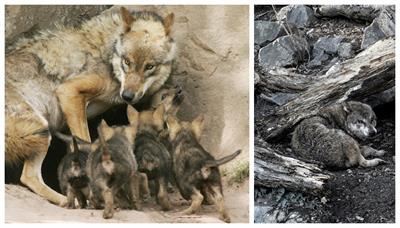
Mother Wolf with cubs; Father Wolf taking rest; Father Wolf waking from his day's rest
An interesting fact about wolves is that they are active during the night. While the humans work during the day, the wolves sleep and take rest. On the other hand, during the night, when people and several other animals are sleeping, the wolves go for their hunting. Such animals are called nocturnal animals.
Hence, you could see that Father Wolf was getting ready to hunt after sleeping and resting through the day. As he moved down, he saw a shadow of something with a bushy tail moving towards him. It was Tabaqui, the jackal. Father Wolf was not happy at the sight of the jackal and cried in annoyance.
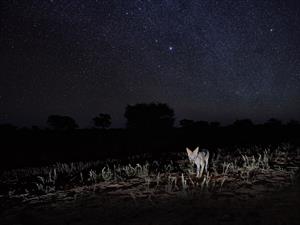
Tabaqui (the Jackal) visits the wolves
Tabaqui came into view and spoke to the wolf. Since Tabaqui was a lazy jackal, he fed on the food left by wolves or other animals. He was quite unpopular among the wolves because he mocked at animals by pretending to be humble and cordial. Moreover, he was a sidekick of Shere Khan, the villain of the story.
Tabaqui realised that the wolf was about to go for his hunting and began with his mockery. He wished Father Wolf good luck on his hunt and called him the chief of the wolves. The jackal was probably hoping that a good hunt to the wolves would gain him a decent dinner. Continuing with the mock-cordiality, the jackal made it plain that he sought food when he wished the wolf-cubs each a set of healthy teeth. As the cubs could grow into great hunters, he wanted them to remember the needy and starving animals like the jackal.
In the dialogues of Tabaqui, one could see that he had used the phrases "o chief of the wolves" and "noble children" to refer to the Father Wolf and his cubs, respectively. This is an instance of him being mock-cordial. Again, this is not a case of flattery, as both Father Wolf and Tabaqui are aware that the compliments are not sincere.
Father Wolf wasn't happy to see Tabaqui at his place. After all, Tabaqui wanted to fill his tummy without working for his food. Nonetheless, the wolf didn't have anything to provide. He explained it in a less friendly tone. He said that the jackal may enter and look for food but would find nothing.
Tabaqui wasn't discouraged, though. He found some dry bones at the cave.
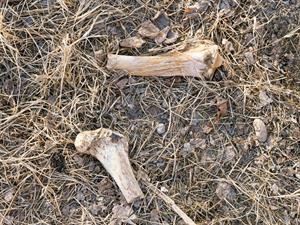
Tabaqui finds some dry bones near the cave
The jackal said how the dry bones are as good as a feast for a poor animal as himself. Being all great and mighty, the wolves may find the bones beneath their standard; but it is not the same for Tabaqui. Being a poor animal, he didn't have the right to be picky.
It is interesting to note that the jackal keeps his sarcasm intact while begging for food.
Tabaqui licked his lips and thanked the wolf for the 'good meal'. He looked at the Father and Mother Wolf and realised that they are uncomfortable.
Tabaqui licked his lips and thanked the wolf for the 'good meal'. He looked at the Father and Mother Wolf and realised that they are uncomfortable.
He picked on his mock-cordiality and commented on the wolf-cubs. Tabaqui knew how to annoy others, and he was very good at it too. Moreover, he sought pleasure in causing discomfort to others. He said, "How beautiful are the noble children! How large are their eyes! And so young too!".
On the other hand, the wolves knew that food was only half the reason why Tabaqui had come to meet them. They were waiting (uncomfortably) for the jackal to reveal the purpose of his visit.
Tabaqui left his sarcasm behind. He now spoke in a tone filled with ill will and the desire to bring harm to the wolves.
Tabaqui revealed that Shere Khan has moved to the hills where the wolves were residing, and he will be hunting among those hills until the next moon. Here, the phrase 'for the next moon' may mean 'for a month'. Typically, a lunar phase lasts for a month, and hence, it takes a month for a new moon to appear.

Phases of moon: a full moon appears once in 27 or 28 days
As explained before, Shere Khan is the villain of the story. Tabaqui calls him the 'Big one', revealing that he is a tiger, the largest of the Big Cats. Though tigers do not attack wolves, they can easily defeat one; however, a tiger may not withstand the attack from a pack of wolves. Hence, they tend to keep away from each other.
Another critical aspect of the scene is that the line 'and so young too' spoken by Tabaqui may have some undertones. The line seemed more like a threat than mockery as Tabaqui might be hinting that the wolf-cubs are too young and might be in danger from Shere Khan.
The narrator gives a brief introduction about Shere Khan. It is said that Shere Khan lived \(20\) miles (or about 30 km) away from the hills. He lived near a river called Waingunga. However, he seems to have shifted his hunting grounds and have come to Seeonee Hills.
Tabaqui succeeded in his mission as Father Wolf was irritated and furious. He called out angrily, saying that Shere Khan had no right to come there. Also, according to the laws of the jungle, peace has to be maintained between the wolves and the greater animals such as tigers. However, changing the hunting grounds without proper warning would make hunting difficult for the wolves. The tiger will scare the weaker animals away, and the wolves will have to work overtime and harder.
Moreover, Father Wolf is worried as he had to even hunt for himself and his family. Since Mother Wolf is nursing their four cubs, she cannot help her husband hunt. Hence, he says, "I have to kill for two, these days".
Later, Mother Wolf reveals a piece of important information about Shere Khan. She says how Shere Khan was crippled and had been lame in one foot since his birth. As a result, he received a nickname; his mother (and eventually everyone else) called him Lungri- meaning 'the lame one'- to denote that he was disabled.
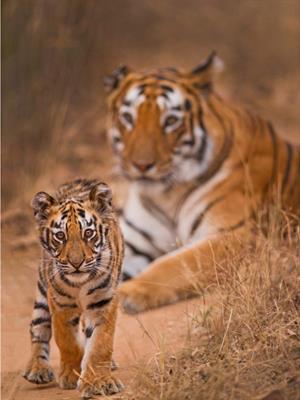
Shere Khan's mother called him Lungri as he was lame since birth
Moreover, Shere Khan never bothered to chase or hunt down his prey. He would simply capture, kill, and eat cattle instead. This practice had angered the villagers of the Waingunga. Mother Wolf fears that the people would soon search the forest of Waingunga for the tiger, and they would set the same on fire. Mother Wolf also sounded distressed because Shere Khan would anger the people of Seeonee Hills and that the wolves may end up running for their lives.
Mother Wolf's dislike towards Shere Khan becomes more pronounced when she sarcastically adds that the wolves are thankful to Shere khan and are happy about his presence in the hills.
Soon after that, Tabaqui leaves the premise but tells the wolves quietly that Shere Khan was down the hill, and one may hear his growl from above.
When Tabaqui left, Father Wolf listened for a sign or sound of the tiger. There was a dry, angry whine of an animal coming from the valley down below. Father Wolf recognised it to be Shere Khan's. The cry revealed that Shere Khan was quite upset and hungry and unable to catch anything for his meal. The narrator describes the cry as being so loud that the entire jungle could hear it.
Father Wolf was unhappy as the sound of the tiger could scare the prey away. Calling the tiger a fool, the wolf expressed his distaste and anger. He wondered how one could begin the hunt with such a loud noise as the sound could scare the prey away. Moreover, the bucks belonging to the hills were relatively fast and agile, unlike the fat bullocks from Waingunga.
Mother Wolf, on the other hand, was paying attention to Shere Khan's growl. She hushed her husband and observed that Shere Khan wasn't hunting a bullock or a buck. His growl revealed that his eyes were set on a human. The roar was so loud and intentional and was seemingly coming from every corner of the forest.
One of the striking characteristics of tigers is that they make loud noises to trap people. The noise would scare people sleeping in the open. As a result, the people would run, scatter, and end up reaching the very mouth of the tiger.
Father Wolf has become uncontrollably angry! He was angry and wondered why Shere Khan should hunt a man when he could easily hunt down insects such as beetles. He was, of course, being sarcastic. The wolf despised the tiger for trying to hunt a human on their grounds.
Father Wolf has become uncontrollably angry! He was angry and wondered why Shere Khan should hunt a man when he could easily hunt down insects such as beetles. He was, of course, being sarcastic. The wolf despised the tiger for trying to hunt a human on their grounds.
The narrator explains why hunting a human was not accepted in the Jungle. According to the Law of the Jungle, animals were forbidden to hunt and eat human except when the animal was killing the human to teach his children how to kill. Still, the animals were bound to hunt outside the grounds.
So why do you think the law prevented animals from hunting a human?
The law prohibits the killing of humans because the act would lead more humans to come to the jungle. Humans would arrive on elephants and attack the forest with guns, fire-torches, and rockets to keep themselves safe. In the end, all the animals in the jungle would suffer.
Human beings are, by far, the greatest enemy of wild and exotic animals. They are also the most significant danger an animal could face. Several animals have gone extinct because of the selfish motives of human beings.
But, as the narrator says, the animals do not consider humans as superior. They also leave the humans aside as they believe the latter to be the weakest of all living things. They are also the most defenceless; as a result, they are not much of a game. Since it is effortless to hunt and kill a human, the 'man-eaters' (the animals who eat humans) become unhealthy, and they lose their teeth and become useless.
Later, the narrator revealed that the tiger's purr grew louder and ended with a loud roar. Soon after the loud ferocious roar, Shere Khan had let out a groan that was untigerish. The cry implied that he wasn't happy.
Mother Wolf assumed that Sher Khan must have missed the human. Father Wolf wondered what caused the disappointed cry and looked down to inspect. He heard Shere Khan muttering and mumbling. The wolf realised that the tiger had accidentally jumped into the woodcutter's campfire and had burned his leg in the process. He also noticed that Tabaqui was with him.
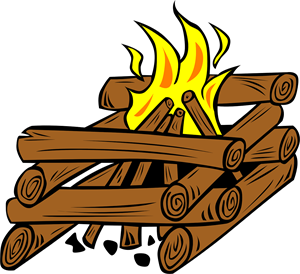
Shere Khan jumped into the woodcutter's campfire
Soon after that, Mother Wolf called out to her husband and informed him that something was coming up the hill. They became alert believing that it was something terrible.
Something was indeed coming towards the wolves. The bushes were moving as if something was pushing through the forest.
As it neared, Father Wolf readied himself to attack the visitor. The wolf jumped up straight into the air for four or five feet, but when he saw who the visitor was, he controlled his movement, stopped his pace, and landed almost where he started. So, more or less, it seemed as if the wolf had a high jump rather than a long jump.
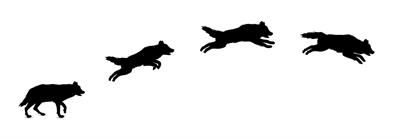
A profile of jumping wolf; Father Wolf tried to stop himself after 2nd stage
It was a child! 'A Man's cub', called out Father Wolf. The visitor was indeed a baby boy. A toddler who could barely walk came through the bushes. He looked so soft and had dimples on his face. Holding onto a low branch, the boy stood naked and looked up into Father Wolf's face and laughed.
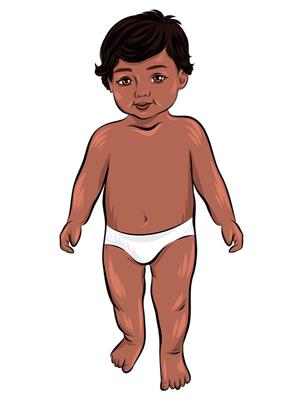
A Man's cub (a baby boy) came through the bushes
When Mother Wolf heard her husband say that it was a Man's cub, she asked him to bring the child to her since she hadn't seen a human baby before.
Father Wolf carried the boy in his mouth and laid him near his cubs. Though the wolf’s jaws held the child’s back, not even a tooth scratched the skin.
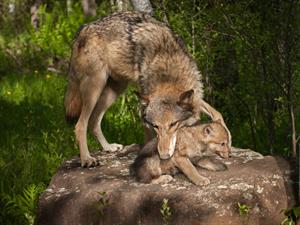
A wolf transports its cub using its mouth
Animals such as wolves transport their young ones using their mouths. While their teeth are quite sharp and can tear into any flesh in a matter of time, they also know how not to use them. For instance, though they carry their cubs using their mouth, they do it so that not even a scratch appears on the little one. As the narrator says, they are capable of eating an egg without breaking it.
Important!
Click here to watch how animals carry their little ones!
Mother Wolf looked at the baby and was surprised to see how little and naked the baby looked. The mother spoke in a tone that was so soft and warm. She said, 'how little, how naked, and how bold!'
Meanwhile, the baby was moving among the cubs. The night neared, and it was getting colder. Moreover, as the boy wasn't wearing any clothes, he pushed through the cubs to reach a warmer place in the cave.
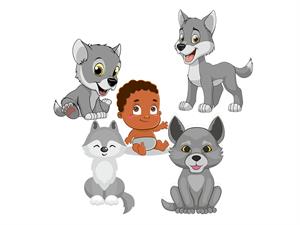
The baby sits with the wolf-cubs
The child blissfully smiled at the wolves while they discussed how bold the child was. It could be seen that Mother Wolf was considering the prospect of having a human child as her own, for she asked her husband whether there was a wolf that had a Man’s cub among her children. Though Father Wolf had heard about such a thing, he had never witnessed the said scenario in his entire life.
The line, "have heard now and again of such a thing, but never in our Pack or in my time", spoken by Father Wolf, can mean either of the following:
1. The stories that the father had heard could be mere rumours.
\(or\)
2. The boy wasn't the first to live among the wolves.
Back to the play, we see that the cave had suddenly become darker as something had blocked the moonlight from the cave entrance. Looking up, the wolves discovered the great head and shoulders of Shere Khan pushing through. Tabaqui was seen at the back of the tiger.
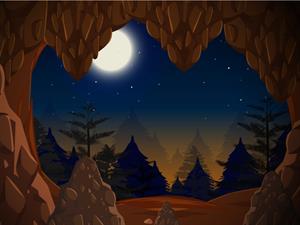
A cave entrance through which the moon is visible
We see Tabaqui being quite servile* when he addresses Shere Khan as 'my lord'.
Tabaqui's evilness and sly character becomes evident when we hear him tell the tiger that the Man's cub had gone inside the cave. From this, it is quite apparent that Tabaqui was not a friend and well-wisher of the wolves. Though Tabaqui informed the wolves about Shere Khan’s arrival, he didn't do it out of good intention.
Father Wolf was angry at his visitors. His tone was filled with contempt when he enquired the tiger why he had come to the cave. One could note that the wolf didn't even bother to address the tiger directly. In the line "what does he need?", it could be observed how 'he'- the tiger- was merely considered as a third person.
Shere Khan was equally furious and wanted his prey back. The tiger ordered the wolves to return the Man's cub. We also learn that the little boy’s parents had escaped, and the tiger would have to get his hands on the boy to satisfy himself. To make matters worse, the tiger had hurt his feet when he jumped into the woodcutter's fire. Hence, Shere Khan was definitely in a bad state. He was furious, embarrassed, annoyed, and in pain.
So, why do you think the tiger was asking the wolf to return the boy? Obviously, the tiger was stronger than the wolf. He could quickly put up a fight with them. So, what prevented the tiger from reaching out and picking up the Man's cub?
The cave. Yes, the cave was too small for the tiger to enter. Shere Khan was stuck where only his head, shoulders, and forepaws could get inside the cave.
Coming back to the play, we see that Father Wolf was quite unhappy with the tiger ordering them around. He retorted back by reminding the tiger that the wolves were free people and never took orders from anyone besides their pack leader. Moreover, we see Father Wolf mocking the tiger by calling him a 'striped cattle-killer'. The wolf also added that the Man’s cub belonged to the wolves to hunt when they choose.
The wolf must have rubbed the tiger's ego, for the tiger responded by saying that choosing was never an option for the wolves. He also added the statement, "it is I, Shere Khan, who speaks!", exhibiting the pure arrogance he had in him.
The wolf must have rubbed the tiger's ego, for the tiger responded by saying that choosing was never an option for the wolves. He also added the statement, "it is I, Shere Khan, who speaks!", exhibiting the pure arrogance he had in him.
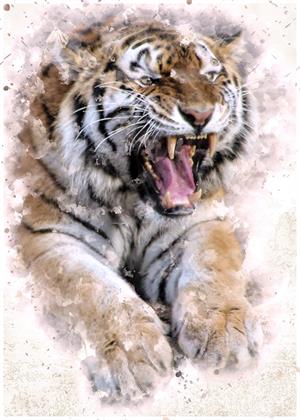
Shere Khan wanted to eat the Man's cub but couldn't enter the cave
The tiger roared in anger, and it sounded as if there was a huge thunder.
For the first time since the appearance of the tiger, Mother Wolf jumped into action. She left her cubs aside and sprang forward. Her eyes were like two green moons in the darkness, and she glared at the burning eyes of Shere Khan.
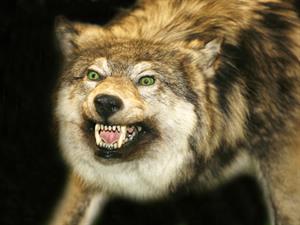
Mother Wolf 's eyes were like two green moons
We had seen previously how the tiger spoke in arrogance when he said, 'it is I, Shere Khan!', as if he was the supreme of all beings. Mother Wolf answered back in a tone that was equally mighty. She said, "and it is I, Raksha, ‘The Demon’, who answers."
Raksha is the name of Mother Wolf. In the Indian context, the word 'raksha' can have two different meanings. As mentioned by Mother Wolf, Raksha can mean 'the demon' as in the word 'raakshasee'. However, it can also mean 'protection'. Hence, the name identifies the two elements in her. She can be a demon to her enemies and a defence to her loved ones.
Mother Wolf continued her speech. She declared that the Man's cub belonged to her. Like her own little ones, the Man's cub would grow, live, and hunt with the Pack of wolves. She was so furious that she announced to the tiger that the child would hunt down and kill Shere Khan in the end.
One could see how protective she has grown towards the Man's cub, and she was ready to fight the ferocious tiger.
Father Wolf, on the other hand, stood amazed, witnessing the might of Raksha. She used to be a strong wolf and would run and hunt with a Pack. The narrator says that the father had almost forgotten how wild the mother used to be in the past. Moreover, he had won her in a fair fight from five other wolves. She also had the nickname "The Demon" to symbolise the savage nature of her hunting. The name was not merely a compliment; she was almost like a demon.
Shere Khan didn't expect Mother Wolf to stand up against him. He backed off a little. Though the tiger had faced Father Wolf, he knew the fight with Mother Wolf would be different. Nobody can mess with an angry mother, for a mother may put everything aside for the safety of her children, and he could see that Raksha was ready to fight to the death. Also, given that he was too big to enter the cave, he knew he had a disadvantage and was at risk.
Hence, Shere Khan pulled himself out of the cave growling. When he knew he was clear and was no longer inside the cave, he shouted. He said how dogs might show their courage when they are inside their territory, meaning that they would become fearful elsewhere.
Father Wolf, on the other hand, stood amazed, witnessing the might of Raksha. She used to be a strong wolf and would run and hunt with a Pack. The narrator says that the father had almost forgotten how wild the mother used to be in the past. Moreover, he had won her in a fair fight from five other wolves. She also had the nickname "The Demon" to symbolise the savage nature of her hunting. The name was not merely a compliment; she was almost like a demon.
Shere Khan didn't expect Mother Wolf to stand up against him. He backed off a little. Though the tiger had faced Father Wolf, he knew the fight with Mother Wolf would be different. Nobody can mess with an angry mother, for a mother may put everything aside for the safety of her children, and he could see that Raksha was ready to fight to the death. Also, given that he was too big to enter the cave, he knew he had a disadvantage and was at risk.
Hence, Shere Khan pulled himself out of the cave growling. When he knew he was clear and was no longer inside the cave, he shouted. He said how dogs might show their courage when they are inside their territory, meaning that they would become fearful elsewhere.
As Father Wolf had said before, the wolves take order from the Chief of the Pack. Hence, Shere Khan reminded the wolves that they have a Pack and retorted how the Pack and their Chief might react to the rearing of a Man's cub. He left the cave by warning the wolves that he would get his hands on the Man's cub as the latter belonged only to him.
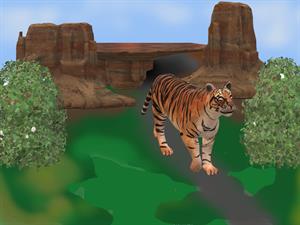
Shere Khan can be seen leaving the cave
Though Mother Wolf stood against Shere Khan, she was also afraid of him. Because, soon after Shere Khan left, she fell on the floor panting.
Though Shere Khan was despicable, he was also speaking the truth where the decision of the Pack was considered. The Man's cub must indeed be shown to the Pack, said Father Wolf gravely to Mother Wolf as she was down panting among the cubs.
The Law of the Jungle declares firmly that every wolf should take his cubs to the Pack Council as soon as they are old enough to stand on their own. The council is normally held once a month on the full moon. The practice is maintained so that the other wolves may accept the cubs. After the inspection, the cubs are free to roam around and are safe from other wolves until they are old enough and have killed their first buck. Until then, the cubs are in complete protection. No explanation will be tolerated if one of them is killed by a grown wolf from the Pack before attaining maturity. The punishment will be death once the killer is found.
Though Shere Khan was despicable, he was also speaking the truth where the decision of the Pack was considered. The Man's cub must indeed be shown to the Pack, said Father Wolf gravely to Mother Wolf as she was down panting among the cubs.
The Law of the Jungle declares firmly that every wolf should take his cubs to the Pack Council as soon as they are old enough to stand on their own. The council is normally held once a month on the full moon. The practice is maintained so that the other wolves may accept the cubs. After the inspection, the cubs are free to roam around and are safe from other wolves until they are old enough and have killed their first buck. Until then, the cubs are in complete protection. No explanation will be tolerated if one of them is killed by a grown wolf from the Pack before attaining maturity. The punishment will be death once the killer is found.
Hence, bringing the Man's cub to the council may turn out to be a blessing to the wolves. However, it was highly risky as the chances of the boy getting accepted by the Pack were very thin. The boy would more likely end up in danger, and Father and Mother Wolf might have to fight against the Pack.
Considering the odds, Father Wolf asked Mother Wolf whether she would want to keep the boy. Mother Wolf made her stance clear. No matter what, she would not let him go. The boy came by night, all naked, alone, and hungry. Yet, he was brave and unafraid. The Mother pointed out how the boy had pushed one of the cubs already.
Considering the odds, Father Wolf asked Mother Wolf whether she would want to keep the boy. Mother Wolf made her stance clear. No matter what, she would not let him go. The boy came by night, all naked, alone, and hungry. Yet, he was brave and unafraid. The Mother pointed out how the boy had pushed one of the cubs already.
Moreover, had Shere Khan killed the boy, the villagers would have hunted the hills in revenge. Shere Khan, on the other hand, would have run back to Waingunga. Hence, Mother Wolf was determined to keep the Man's cub.
Later, she addressed the little boy for the first time since his arrival. She called him 'little frog' and comforted him by asking him to lie still and at ease. She named him Mowgli the Frog. The boy reminded the wolves of a frog as he didn't have any fur and could not lie still. The play ends where Mother Wolf took a wow that there would come a time when Mowgli would hunt Shere Khan as he had hunted him.
Later, she addressed the little boy for the first time since his arrival. She called him 'little frog' and comforted him by asking him to lie still and at ease. She named him Mowgli the Frog. The boy reminded the wolves of a frog as he didn't have any fur and could not lie still. The play ends where Mother Wolf took a wow that there would come a time when Mowgli would hunt Shere Khan as he had hunted him.
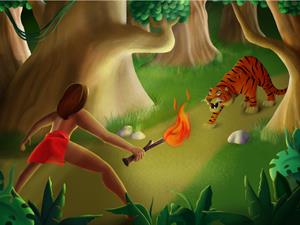
'The time will come when Mowgli will hunt Shere Khan', says Mother